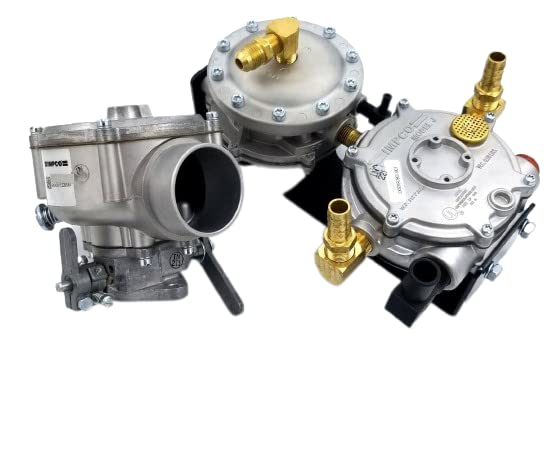Automotive
Converting Forklifts to Propane: Benefits and Considerations

In material handling, forklifts are unsung heroes, indispensable for the efficient flow of goods in various industries. Traditionally powered by gasoline or diesel, businesses increasingly explore the advantages of converting their forklifts to propane. This article will look into the benefits and considerations of this conversion, shedding light on why it’s becoming an attractive option for many. Additionally, we will explore the role of propane conversion kits in facilitating this transition.
Propane conversion kits are instrumental in transforming conventional forklifts into eco-friendly and cost-effective propane-powered machines. They represent a gateway to unlocking the manifold advantages of propane, including reduced environmental impact, long-term cost savings, enhanced convenience, improved performance, and versatility.
The Green Advantage of Propane
Propane’s environmental benefits are a vital driver for businesses considering forklift conversion. Unlike gasoline or diesel, propane is a cleaner-burning fuel, emitting fewer pollutants into the atmosphere. This results in a substantial reduction in greenhouse gas emissions, aligning with the global push for sustainability. Propane-powered forklifts produce significantly lower carbon monoxide, nitrogen oxides, and particulate matter emissions. This reduced environmental impact benefits the planet and helps companies comply with stringent environmental regulations. As a result, propane stands as a more eco-friendly choice for forklift operations.
Cost-Efficiency in the Long Run
The decision to convert forklifts to propane might seem financially daunting initially, given the associated conversion costs and the purchase of propane-powered forklifts. However, the long-term operational cost savings can justify this investment. Propane generally proves to be a cost-effective fuel option compared to gasoline or diesel, boasting more stable pricing over time. Additionally, propane engines have longer lifespans and demand less frequent maintenance than gasoline or diesel. This translates to reduced downtime, lower maintenance expenditures, and, ultimately, enhanced cost-efficiency in the long run.
Convenience and Versatility
Propane forklifts offer unparalleled convenience and versatility in material handling operations. Propane is stored in portable tanks, ensuring a straightforward and efficient refueling process. This convenience minimizes downtime and maximizes productivity, crucial factors in fast-paced industrial environments. Moreover, propane-powered forklifts are renowned for their adaptability. Their clean-burning characteristics enable them to be used both indoors and outdoors seamlessly. This flexibility makes them ideal for warehouses and distribution centers, where indoor and outdoor tasks often intertwine.
Improved Performance and Efficiency
Propane-powered forklifts excel in terms of performance and efficiency. These engines provide a consistent and reliable power output throughout their operational lifespan. This reliability translates into stable and dependable forklift performance, critical for tasks that demand precision and consistency. Also, propane engines are less prone to cold-start issues than diesel engines. This feature is especially advantageous in colder climates, where traditional diesel engines might struggle to start efficiently. Propane-powered forklifts’ enhanced performance and efficiency significantly increase uptime and overall productivity.
Infrastructure and Safety Considerations
Transitioning to propane forklifts necessitates careful consideration of infrastructure and safety measures. Firstly, businesses need to invest in propane refueling infrastructure, which includes propane refueling stations or cylinders. Adequate ventilation is essential, especially when operating propane-powered forklifts indoors, to ensure the safety of employees and compliance with safety regulations. Safety protocols must be established and rigorously followed, including proper handling and storage of propane tanks. Regular inspections and maintenance of propane systems are crucial to prevent accidents and maintain safe and efficient operations.
Initial Investment and ROI Analysis
Before embarking on the conversion journey, a thorough analysis of the initial investment and the expected return on investment (ROI) is essential. Factors such as conversion costs, ongoing propane prices, maintenance cost savings, and anticipated gains in productivity must be considered. While the upfront costs associated with conversion may appear substantial, they should be weighed against the long-term benefits. Calculating the ROI timeline helps businesses determine when to anticipate recouping their investment through reduced operational costs and increased operational efficiency. A well-considered ROI analysis is crucial for making informed decisions regarding forklift conversion to propane.
FAQ:
Q: Why should I convert my forklifts to propane?
A: Converting your forklifts to propane can offer several benefits, such as lower fuel costs, reduced emissions, longer engine life, and improved performance. Propane is also widely available, easy to store, and safe to use.
Q: How do I convert my forklifts to propane?
A: To convert your forklifts to propane, you need to install a propane conversion kit, which consists of a propane tank, a regulator, a mixer, and a fuel lock-off. You must also adjust the carburetor, the ignition timing, and the air-fuel ratio.
Q: How much does it cost to convert my forklifts to propane?
A: The cost of converting your forklifts to propane depends on several factors, such as the type, model, and condition of your forklifts, the size and capacity of the propane tank, and the labor and installation fees. However, the average cost of a propane conversion kit ranges from $500 to $1,500 per forklift.
Q: What are the maintenance requirements for propane forklifts?
A: Propane forklifts require regular maintenance, such as checking the fuel level, inspecting the tank and hoses for leaks or damages, replacing the fuel filter and spark plugs, and cleaning the carburetor and the mixer.
Q: What are the safety precautions for propane forklifts?
A: Propane forklifts are safe if you follow some safety precautions, such as wearing protective equipment, securing the tank and hoses, avoiding open flames or sparks, and ventilating the work area. You must also store the propane tanks in a cool, dry, and well-ventilated place, away from heat sources or combustible materials.
Conclusion
In conclusion, the decision to convert forklifts to propane, facilitated by propane conversion kits, offers many benefits for businesses involved in material handling. Propane’s environmental advantages and cost-efficiency, convenience, improved performance, and versatility make it a compelling choice. However, this transition requires meticulous attention to infrastructure and safety aspects and a comprehensive ROI analysis.
Implementing propane conversion kits signifies a proactive step toward sustainability and operational efficiency. It enables companies to significantly reduce their carbon footprint, adhere to stringent environmental regulations, and achieve long-term cost savings. Moreover, the convenience of propane refueling, improved forklift performance, and adaptability to diverse operational environments are invaluable.
As industries evolve and environmental concerns deepen, embracing propane-powered forklifts through the aid of propane conversion kits is a strategic move for businesses striving to thrive in a dynamic and eco-conscious landscape. It demonstrates a commitment to sustainability and positions them for enhanced operational efficiency and competitiveness in the years to come.





















































